MercoPress. South Atlantic News Agency
Tag: Antartica
-
Thursday, January 5th 2012 - 05:36 UTC
Piñera reaffirms Antarctica policy and invites Mujica to visit Chilean bases

Chilean president Sebastián Piñera will be flying to Antarctic next 13 to 15 January together with his Uruguayan peer Jose Mujica, announced on Wednesday Chile’s Foreign Affairs minister Alfredo Moreno.
-
Wednesday, January 4th 2012 - 17:37 UTC
Pale octopus and yeti crabs found surrounding hydrothermal vents near Antarctica
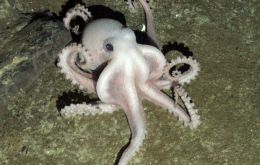
Communities of species previously unknown to science have been discovered on the seafloor near Antarctica, clustered in the hot, dark environment surrounding hydrothermal vents.
-
Monday, January 2nd 2012 - 00:51 UTC
Scott’s spirit and contribution to science to be honoured by Antarctic expedition
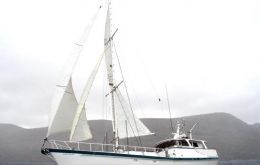
The New Year marks the 100th Anniversary of Captain Robert Scott’s Antarctic endeavors and his heroic efforts to reach the South Pole, which ultimately led to his team’s tragic demise in 1912.
-
Thursday, December 29th 2011 - 22:07 UTC
Scientists establish critical benchmark link for seabirds and available food
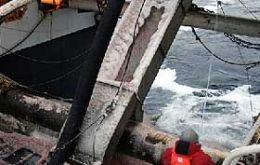
An international group of scientists has shown that many seabirds begin to suffer when the food available for them in the ocean declines below a critical level. This level is about one-third of the maximum measured amount of food available. They have found that this critical level is about the same for seabird species around the world. Their study — the most comprehensive ever undertaken — covers birds from the Arctic to the Antarctic and from the Pacific to the Atlantic.
-
Tuesday, November 29th 2011 - 15:42 UTC
Ice Patrol HMS Protector steaming for its deployment to Antarctica

The Royal Navy's new ice patrol ship, HMS Protector left Portsmouth Monday for a seven-month deployment surveying and patrolling the frozen continent of Antarctica. The 5.000-tons ice-breaking ship completed an intensive period of sea trials and training prior to deploying to the Antarctic Peninsula.
-
Thursday, November 3rd 2011 - 00:11 UTC
International coalition promotes network of Antarctica marine protected areas

A new international coalition is working to set up a network of designated marine protected areas (MPA) and no-take marine reserves in the oceans surrounding Antarctica.
-
Thursday, October 27th 2011 - 20:13 UTC
Centennial of Amundsen and Scott’s South Pole feat next 14 December
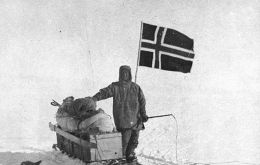
British and Norwegian teams are in Punta Arenas, extreme south of Chile, preparing for a repeat of the South Pole feat on 14 December 1911 first accomplished by explorer Roald Amundsen and a month later by Sir Robert Scott.
-
Monday, October 3rd 2011 - 07:14 UTC
“Ozone hole” over the Arctic claims NASA; blames long spell of cold weather
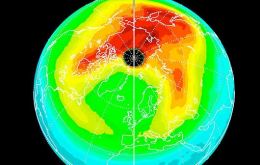
Ozone loss over the Arctic this year was so severe that for the first time it could be called an “ozone hole” like the Antarctic one, scientists report. About 20km above the ground, 80% of the ozone was lost, they say.
-
Friday, September 23rd 2011 - 19:53 UTC
HMS Protector ready for Antarctica; no helicopter on maiden deployment

Icebreaker HMS Protector, formerly MV Polarbjørn, has spent the spring and summer steadily being converted into a hydrographic survey ship to plug the gap left by HMS Endurance which nearly sank during a flooding incident in late 2008.
-
Wednesday, September 7th 2011 - 11:01 UTC
King crabs found on the edge of Antarctica as a result of warming waters

King crabs have been found on the edge of Antarctica, probably as a result of warming in the region, scientists say. Writing in the journal Proceedings B, scientists report a large, reproductive population of crabs in the Palmer Deep, a basin cut in the continental shelf.
